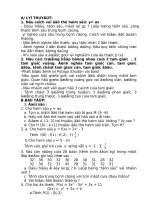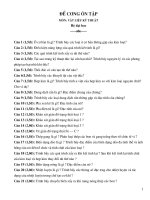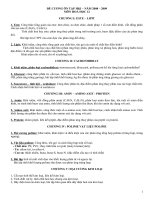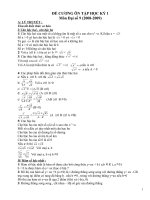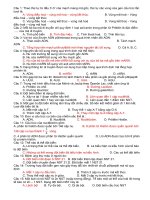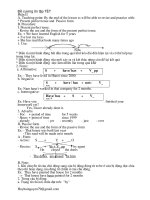DE CUONG ON TAP- (1)-
Bạn đang xem bản rút gọn của tài liệu. Xem và tải ngay bản đầy đủ của tài liệu tại đây (291.22 KB, 17 trang )
Đề cương ôn thi HKII-Tiếng Anh 9
Vinh long Secondary School ĐỀ CƯƠNG ÔN THI HỌC KÌ I
I
Name:……………………………………… Môn:Tiếng Anh Lớp 9 (2007-2008)
A. Lý thut:
1)Cách dùng các thì:
a.Hiện tại đơn: am/ is/ are
V
1
/V
S-ES
*Nhận biết: always/ usually/ often/ sometimes/ never/ every………
b.Hiện tại tiếp diễn: am/ is/ are +V-ing
*Nhận biết: now/ at the moment
c.Hiện tại hoàn thành: have/ has+ V
3
/ V
ED
*Nhận biết: since/ for/just/already/yet/recently.
d.Qúa khứ đơn: was/ were *Nhận bíêt: yesterday/last/ ago,Mệnh đề có When…..
V
2
/ V
ED
e.Tương lai đơn: will + V
1
*Nhận
biết: tomorrow/ next/ someday…….
f.Quá khứ tiếp diễn: was / were + V-ing
*Nhận biết: while / at that time /TG ở quá khứ/ Mệnh đề có When…
2)Câu điều kiện:
Câu điều kiện loại 1(có thể xảy ra ở hiện tại & tương lai):
If Clause Main Clause
HTĐ am/is/are
V
1
/Vs-es
TLĐ : Will +V
1
- Câu điều kiện loại 2 ( Kh«ng cã thùc ë hiƯn t¹i vµ qu¸ khø):
If Clause Main Clause
QK§ was/were
QKG§ V
2
/V-ed
TLĐK: Would +V
1
3. Wish :
Wish ở tương lai:
That là tuỳ chọn (có hoặc khơng có). Hai chủ ngữ (S) có thể giống nhau hoặc khác
nhau.
We wish that you could come to the party tonight. (We known you can't come)
GVBM: Ch©u ThÞ H ¬ng Giang
1
Đề cương ôn thi HKII-Tiếng Anh 9
Wish ở hiện tại
S + wish + (that) + S + simple past tense ...
Động từ ở mệnh đề sau wish sẽ chia ở Simple past, to be phải chia là were ở tất cả các
ngơi.
I wish that I had enough time to finish my homework.
Lưu ý : Động từ ở mệnh đề sau wish bắt buộc phải ở dạng điều kiện khơng thể thực
hiện được nhưng điều kiện ấy ở thời nào lại phụ thuộc vào chính thời gian của bản
thân mệnh đề chứ khơng phụ thuộc vào thời của wish.
She wishes that she could have gone earlier yesterday.(Past)
He wished that he would come to visit me next week.(Future)
The photographer wished we stood clother than we are standing now. (Present).
4)Cách dùng tính từ & trạng từ:
Am/is/are/was/were + Adj (tính từ)
Look/make/feel
V +Adv(trạng từ)
*Lưu ý:-Adj ko ly ;Adv có ly
-ngoại lệ: good (Adj) well(Adv)
5)Liên từ:
*And(và):bổ sung thông tin *But(nhưng)=However(tuy nhiên):chỉ sự tương fản
*Or(hoặc):chỉ sự chọn lựa *So=Therefore(vì thế):chỉ hậu quả,kết quả
*Because(bởi vì):chỉ nguyên nhân
6)Mệnh đề chỉ nguyên nhân:
Clause 1 +Because/Since/As + Clause 2
7)MƯnh ®Ị chØ sù nhỵng bé:
Clause(chính) +Although/Even though/Though + Clause (nhượng bộ)
8)THAT- Clause:
S +be +Adj +THAT + Clause
9)Infinitive/To infinitive/V-ing:
*Can/could *Prefer/get *Love/like
May/might Allow/permit Dislike/hate
Have to/Ought to Want/need Enjoy
Should Ask/tell Suggest
Must V
1
Advise To-inf Finish/mind V-ing
Make/help Start/decide Giới từ
Used to Would you like (on/in/at/of…)
Let’s It’s + Adj
Have/Feel
GVBM: Ch©u ThÞ H ¬ng Giang
2
ẹe cửụng oõn thi HKII-Tieỏng Anh 9
10. Câu trực tiếp và gián tiếp
Trong cõu trc tip thụng tin i t ngi th nht n thng ngi th hai (ngi th
nht núi trc tip vi ngi th hai).
He said "I bought a new motorbike for myself yesterday".
Trong cõu giỏn tip thụng tin i t ngi th nht qua ngi th hai n vi ngi th
ba. Khi ú cõu cú bin i v mt ng phỏp.
He said he had bought a new motorbike for himself the day before.
bin i mt cõu trc tip sang cõu giỏn tip cn:
1. i ch ng v cỏc i t nhõn xng khỏc trong cõu trc tip theo ch ng ca
thnh phn th nht.
2. Lựi ng t v th 2 xung mt cp so vi lỳc ban u.
3. Bin i cỏc i t ch th, phú t ch thi gian v a im theo bng qui nh.
Bảng đổi động từ
Direct speech Indirect speech
Simple present
Present progressive
Present perfect (Progressive)
Simple past
Will/Shall
Can/May
Simple past
Past progressive
Past perfect (Progressive)
Past perfect
Would/ Should
Could/ Might
Bng i cỏc i t ch th, phú t ch a im v thi gian
Today
Yesterday
The day before yesterday
Tomorrow
The day after tomorrow
Next + Time
Last + Time
Time + ago
This, these
Here, Overhere
That day
The day before
Two days before
The next/ the following day
In two days' time
The following + Time
The previous + Time
Time + before
That, those
There, Overthere
Nu li núi v hnh ng xy ra cựng ngy thỡ khụng cn phi i thi gian.
At breakfast this morning he said "I will be busy today".
At breakfast this morning he said he would be busy today.
GVBM: Châu Thị H ơng Giang
3
Đề cương ôn thi HKII-Tiếng Anh 9
Các suy luận logic về mặt thời gian tất nhiên là cần thiết khi lời nói được thuật lại sau
đó một hoặc hai ngày.
(On Monday) He said " I'll be leaving on Wednesday "
(On Tuesday) He said he would be leaving tomorrow.
(On Wednesday) He said he would be leaving today.
11)Đại từ quan hệ:
*Who(người mà):thay thế cho chủ ngữ chỉ người ở câu thứ 2.
*Which( c¸i mà):thay thế cho danh từ chỉ vật ở câu thứ 2.
*Lưu ý:có thể dùng THAT thay thế cho WHO/WHICH ở mệnh đề quan hệ xác đònh(ko bỏ được)
12. So s¸nh:
-So sánh ngang bằng
Cấu trúc sử dụng là as .... as
S + V + as + {adj/ adv} + as + {noun/ pronoun}
My book is as interesting as yours.
His car runs as fast as a race car.
Danh từ cũng có thể được dùng để so sánh, nhưng nên nhớ trước khi so sánh phải đảm
bảo rằng danh từ đó phải có các tính từ tương đương.
adjectives nouns
heavy, light weight
wide, narrow width
deep, shallow depth
long, short length
big, small size
Khi so sánh bằng danh từ, sử dụng cấu trúc sau:
S + V + the same + (noun) + as + {noun/
pronoun}
My house is as high as his.
My house is the same height as his.
Chú ý rằng ngược nghĩa với the same...as là different from... Khơng bao giờ dùng
different than. Sau đây là một số ví dụ khác về so sánh bằng danh từ.
These trees are the same as those.
He speaks the same language as she.
-So sánh hơn - kém
GVBM: Ch©u ThÞ H ¬ng Giang
4
ẹe cửụng oõn thi HKII-Tieỏng Anh 9
Cỏc tớnh t v phú t c bit
Mt s ớt tớnh t v phú t cú dng thc so sỏnh c bit. Chỳng khụng theo cỏc quy
tc nờu trờn. Nghiờn cu bng sau:
Tớnh t hoc trng t
So sánh hơn
So sánh nht
far
farther
further
farthest
furthest
little
few
less least
much
many
more most
good
well
better best
bad
badly
worse worst
B. Bài tập ứng dụng
I.Combine the sentences,using Relative Pronouns:
1)Trinh Cong Son was dead. He composed many famous songs.
2)A scientist has won the Nobel prize. He discovered a new planet.
3)This is the car. You want to buy it.
4)The books are for reading. They are on the shelves.
5)My friend Tom can compose songs. He sings pop music very well.
6)Auld Lang Syne is a song. Auld Lang Syne is sung on New Year Eve.
II.Rewrite the sentences:
1)People play soccer all over the world
Soccer
GVBM: Châu Thị H ơng Giang
5
Ñeà cöông oân thi HKII-Tieáng Anh 9
2)We don’t have enough money to go on a holiday
If we……………………………………………………………………………………
3)Please don’t play the music so loudly
Would you mind…………………………………………………………………………………………………………………………………………
4)The last time I played soccer was 5 years ago
I haven’t………………………………………………………………………………………………………………………………………………………
5)Jim could see the main part of the show. He was late because of the traffic jam
Although………………………………………………………………………………………………………………………………………………………
6)I’m learning English. I like learning English.
I’m…………………………………… and…………………………………………………
7)The weather was bad, so we can’t go out
Since…………………………………………………………………………………………
8)I think we should travel to school by bus.
I suggest……………………………………………………………………………………
9) Why don’t we go hunting?
I suggest…………………………………………………………………………………………
10)Let’s go out for dinner.
How about……………………………………………………………………………………?
11)Nam doesn’t study hard. He can’t pass the exam.
If Nam……………………………………………………………………………………………………
12)I suggest using the showers instead of baths to save water.
I think we should……………………………………………………………………………
13)I still come to school, but I’m sick.
Even though……………………………………………
14)A girl is now in the hospital. She was injured in the accident.
A girl………………………………………………………………………………………………………………
15)The girl has just gone out. Do you know her?
Do you……………………………………………………………………………………?
16)Mai writes poems. She is fond of it.
Mai is fond of……………………………………………………………………………
17)I stay at home because it’s raining.
As…………………………………………………………………………………
III.Put the verbs in brackets in correct tense:
I(come)……………………from Switzerland. I(come)………………to London six months ago to
learn English. I(not meet)……………………………any English people yet, only my teacher. I (start)
………………………
learning English at school in Swizerland when I was eleven, so I (learn)……………………………it
for nearly ten years. At first in London, I(not understand)…………………………………anything, but
GVBM: Ch©u ThÞ H ¬ng Giang
6
